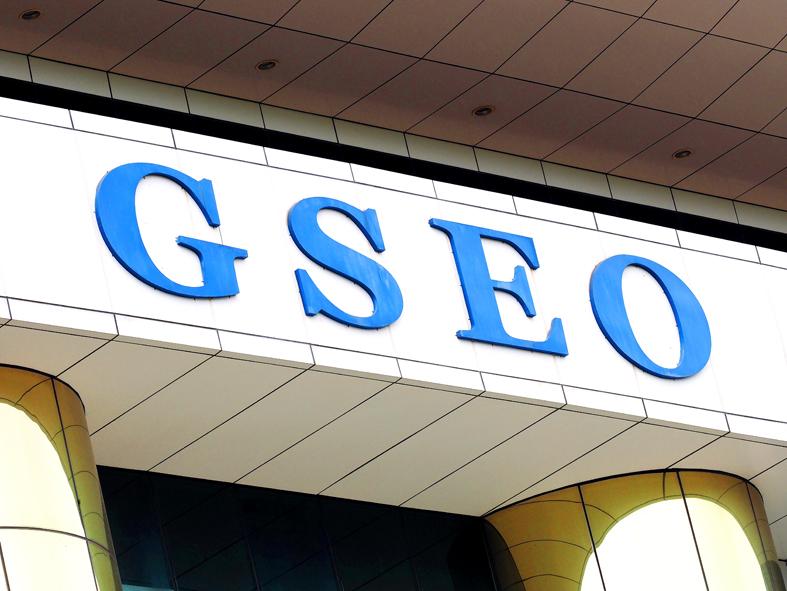Handset camera lens maker Genius Electronic Optical Co (玉晶光) yesterday said that it is looking to metaverse-related optical products as a future engine for growth as sales of smartphones are softening.
The company, which counts Apple Inc among its major customers, told an investors’ conference that it has started shipping some lenses for metaverse-related gadgets and that it hopes to start mass production by next year.
“Metaverse-related products will contribute to our revenue growth next year,” Genius Electronic chairman Jones Chen (陳天慶) said.

Photo: David Chang, EPA-EFE
“The exact quantity and specifications will depend on our clients’ needs,” he said.
The fourth quarter of this year and the first quarter of next year are looking to be “stronger than usual,” Chen said, citing the company’s order visibility.
“With the industry migrating toward multi-lenses and larger CMOS sensors, clients’ demand for our products will keep on growing,” he said. “We have to keep up with clients’ latest specifications to increase our market share.”
Metaverse-related products have been a popular theme for investors of late.
Genius Electronic is currently focusing on the virtual reality (VR) segment, while augmented reality (AR) products might follow in three years, company president Lee Kuo (郭英理) said.
“Optical equipment is at the heart of the metaverse. A mid-range VR device will typically require six to eight cameras to detect distance, as well as do eye-tracking,” Kuo said.
Kuo added that he is confident Genius Electronic can fulfill customers’ demand for this challenging new field.
“If they can write the specs, whether it’s for AR or VR, we will rise up to the challenge,” he said.
Kuo sees some economic challenges ahead.
“Inflation is going to come, while COVID-19 will remain with us. What is within our control is to raise our production yield and hopefully increase our gross margin,” he said.
The company reported that net profit decreased 7.26 percent year-on-year to NT$974.75 million (US$35.06 million) in the third quarter, although revenue increased 14.09 percent to NT$5.92 billion.
Earnings per share (EPS) were NT$8.71, down from NT$9.44 a year earlier.
Chen attributed the lower earnings to the New Taiwan dollar’s appreciation and falling prices for its older products.
The company also needs to improve production yields on new products, he added.
Revenue for this quarter and next quarter would depend on client demand, while profit would depend on whether the company could increase its yields, he said.
“It is hard to give an estimate right now,” Chen said.
In the first three quarters of the year, revenue edged up 0.42 percent to NT$11.02 billion, but net profit fell 33.29 percent year-on-year to NT$1.38 billion, or EPS of NT$12.27, company data showed.

IN THE AIR: While most companies said they were committed to North American operations, some added that production and costs would depend on the outcome of a US trade probe Leading local contract electronics makers Wistron Corp (緯創), Quanta Computer Inc (廣達), Inventec Corp (英業達) and Compal Electronics Inc (仁寶) are to maintain their North American expansion plans, despite Washington’s 20 percent tariff on Taiwanese goods. Wistron said it has long maintained a presence in the US, while distributing production across Taiwan, North America, Southeast Asia and Europe. The company is in talks with customers to align capacity with their site preferences, a company official told the Taipei Times by telephone on Friday. The company is still in talks with clients over who would bear the tariff costs, with the outcome pending further

NEGOTIATIONS: Semiconductors play an outsized role in Taiwan’s industrial and economic development and are a major driver of the Taiwan-US trade imbalance With US President Donald Trump threatening to impose tariffs on semiconductors, Taiwan is expected to face a significant challenge, as information and communications technology (ICT) products account for more than 70 percent of its exports to the US, Chung-Hua Institution for Economic Research (CIER, 中華經濟研究院) president Lien Hsien-ming (連賢明) said on Friday. Compared with other countries, semiconductors play a disproportionately large role in Taiwan’s industrial and economic development, Lien said. As the sixth-largest contributor to the US trade deficit, Taiwan recorded a US$73.9 billion trade surplus with the US last year — up from US$47.8 billion in 2023 — driven by strong

A proposed 100 percent tariff on chip imports announced by US President Donald Trump could shift more of Taiwan’s semiconductor production overseas, a Taiwan Institute of Economic Research (TIER) researcher said yesterday. Trump’s tariff policy will accelerate the global semiconductor industry’s pace to establish roots in the US, leading to higher supply chain costs and ultimately raising prices of consumer electronics and creating uncertainty for future market demand, Arisa Liu (劉佩真) at the institute’s Taiwan Industry Economics Database said in a telephone interview. Trump’s move signals his intention to "restore the glory of the US semiconductor industry," Liu noted, saying that

AI: Softbank’s stake increases in Nvidia and TSMC reflect Masayoshi Son’s effort to gain a foothold in key nodes of the AI value chain, from chip design to data infrastructure Softbank Group Corp is building up stakes in Nvidia Corp and Taiwan Semiconductor Manufacturing Co (TSMC, 台積電), the latest reflection of founder Masayoshi Son’s focus on the tools and hardware underpinning artificial intelligence (AI). The Japanese technology investor raised its stake in Nvidia to about US$3 billion by the end of March, up from US$1 billion in the prior quarter, regulatory filings showed. It bought about US$330 million worth of TSMC shares and US$170 million in Oracle Corp, they showed. Softbank’s signature Vision Fund has also monetized almost US$2 billion of public and private assets in the first half of this year,